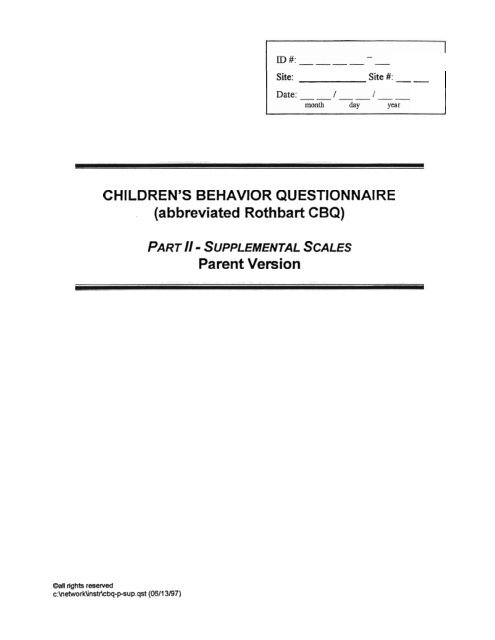CHILDREN'S BEHAVIOR QUESTIONNAIRE - Early Child Care and ...
CHILDREN'S BEHAVIOR QUESTIONNAIRE - Early Child Care and ...
CHILDREN'S BEHAVIOR QUESTIONNAIRE - Early Child Care and ...
- No tags were found...
Create successful ePaper yourself
Turn your PDF publications into a flip-book with our unique Google optimized e-Paper software.
I site:Site #: --I<strong>CHILDREN'S</strong> <strong>BEHAVIOR</strong> <strong>QUESTIONNAIRE</strong>(abbreviated Rothbart CBQ)PART 11 - SUPPLEMENTAL SCALESParent VersionOall rights reservedc:\network\instr\cbq-psup.qst (0611 3/97)
On the next' several pages you will see a set of statements that describe children's reactions to anumber of situations. We would like you to tell us what your child's reaction is likely to be in thosesituations. Of course, there are no "correct" ways of reacting; children differ widely in their reactions,<strong>and</strong> it is these differences we are trying to learn about. Please read each statement <strong>and</strong> decidewhether it is a "m or "untrue" description of your child's reaction within the past six months. Usethe following scale to indicate how well a statement describes your child:if the statement is:1 ............... extremely untrue of your child2 ............... quite untrue of your child3 ............... slightly untrue of your child4 ............... neither true nor false of your child5 ............... slightly true of your child6 ............... quite true of your child7 ............... extremely true of your childIf you cannot answer one of the items because you have not seen your child in that situation in thepast six months, for example if the statement is about this child's reaction to your singing <strong>and</strong> youhave not sung to himlher, then circle NA (not applicable).Please be sure to circle a number or NA for every item.Mv child:mithcrextremely quiteuntrue untrueslightly true slightlyuntrue nor false truequite extremelytruea. Is not very sensitiveto people's moods ........... 1 2 3 4 5 6 7 NAb. Rarely hits other children,even when angry ............ 1 2 3 4 5 6 7 NAc. Rarely asks for help indressing ................... 1 2 3 4 5 6 7 NAd. Looks pleased when otherpeople act happy ............ 1 2 3 4 5 6 7 NAe. Rarely yells at others evenwhen slhe is upset ........... 1 2 3 4 5 6 7 NAf. Is sensitive to howothers are feeling ............ 1 2 3 4 5 6 7 NAg. Sometimes blames other peoplewhen slhe has made a mistake . 1 2 3 4 5 6 7 NAh. Sometimes throws things whenangry ..................... 1 2 3 4 5 6 7 NA
neitherextremely quite slightly true slightly quite extremelyuntrue untrue untrue nor falsei. Doesn't seem very upset whencaught doing something wrong . . 1 2 3 4 5 6 7 NAj. Rarely asks for help infinding clothes ............... 1 2 3 4 5 6 7 NAk. Feels good when good thingshappen to characters on N .... 1 2 3 4 5 6 7 NAI. Seems to feel guilty when slhehas broken a rule ............ 1 2 3 4 5 6 7 NAm. Seems to feel bad aboutdoing something wrong evenafter being forgiven ........... 1 2 3 4 5 6 7 NAn. Asks for help when stheis afraid .................... 1 2 3 4 5 6 7 NAo. Criticizes others whens/he is angry ................ 1 2 3 4 5 6 7 NAp. Asks other children to helpherlhim with projects .......... 1 2 3 4 5 6 7 NAq. Sometimes blames himiherselfwhen something goes wrong ... 1 2 3 4 5 6 .7 NAr. Does not usually becomedistressed when otherchildren are upset ............ 1 2 3 4 5 6 7 NAs. Confesses slhe has donesomething wrong beforeparent finds out .............. 1 2 3 4 5 6 7 NAt. Becomes very ashamed if shemakes a mistake in public ...... 1 2 3 4 5 6 7 NAu. Rarely seeks help when slhe ishaving trouble with something ... 1 2 3 4 5 6 7 NAv. Doesn't act very upsetwhen slhe has donesomething wrong ............. 1 2 3 4 5 6 7 NAw. Usually tries to work outdifficulties alone <strong>and</strong> rarelyasks for help ................ 1 2 3 4 5 6 7 NA
Mv child:neitherextremely quiteuntrue untrueslightly trueuntrue nor falseslightly quite extremelytruex. Sometimes starts fights withother children ............... 1 2 3 4 5 6 7 NAy. Sometimes asks for help inthings she is able to do.(e.g., cutting up food) ......... 1; 2 3 4 5 6 7 NAz. Becomes upset when slhethinks someone else hasbeenhurt ................... 1 2 3 4 5 6 7 NAaa. Takes toys away fromother children ; 1 2 3 4 5 6 7 NA..............bb. Usually asks for help ondifficult tasks ................ 1 2 3 4 5 6 7 NAcc. Does not seem to be veryupset when parents are inabadmood ................. 1 2 3 4 5 6 7 NAdd. Sometimes breaks things whenupset ...................... 1 2 3 4 5 6 7 NATHANK YOU !






